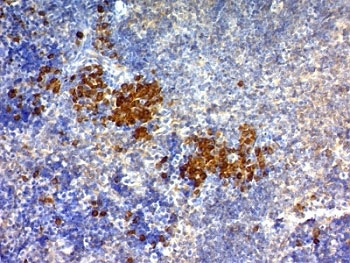- Tel: 858.663.9055
 Email: info@nsjbio.com
Email: info@nsjbio.com
- Tel: 858.663.9055
- Email: info@nsjbio.com
Endosomes are essential membrane-bound organelles that play a critical role in the internalization, sorting, and trafficking of cellular cargo. They function as key intermediaries in the process of endocytosis, where substances such as nutrients, hormones, and cell surface receptors are taken into the cell for processing or degradation. Endosomes are crucial for various cellular processes, including receptor recycling, antigen presentation, and the regulation of intracellular signaling pathways. Dysfunction in endosomal processes is associated with various diseases, including neurodegenerative disorders, cancer, and viral infections.
Endosome Antibodies are powerful tools for investigating the structure and function of endosomes in health and disease. These antibodies enable researchers to study how endosomes contribute to cellular homeostasis and how disruptions in endosomal trafficking can lead to disease.
Several key proteins are involved in the complex processes of endosomal trafficking, sorting, and processing. These proteins help maintain the function and integrity of endosomes, enabling the efficient transport and degradation of cellular materials. Some important Endosome Antibodies target the following proteins:
Rab5: A small GTPase that regulates the early stages of endosome formation and trafficking. Endosome Antibodies targeting Rab5 help monitor the dynamics of early endosomes and their interactions with other cellular compartments.
EEA1: Early endosome antigen 1 (EEA1) is a critical component of the early endosomal machinery, involved in vesicle docking and fusion. Endosome Antibodies against EEA1 are useful for studying the maturation of early endosomes and their role in cellular signaling.
Clathrin: A key protein involved in the formation of clathrin-coated vesicles that mediate the internalization of cargo into endosomes. Endosome Antibodies to clathrin help study receptor-mediated endocytosis and the internalization of signaling molecules.
VPS34: A phosphoinositide kinase that regulates the formation of autophagosomes and endosomes. Endosome Antibodies targeting VPS34 are important for understanding autophagy and endosomal maturation.
LAMP1: Lysosomal-associated membrane protein 1 (LAMP1) is an integral protein of the late endosome and lysosome membranes. Endosome Antibodies to LAMP1 are commonly used to investigate late-stage endosome trafficking and lysosomal degradation pathways.
These proteins, along with their associated processes, make the endosome an essential component of cellular trafficking. Endosome Antibodies allow researchers to dissect these complex pathways and gain insights into endosome biology and disease mechanisms.
Endosome Antibodies are indispensable in cellular research, helping scientists explore the dynamics of endosomal trafficking, receptor internalization, and cellular homeostasis. The following are common experimental techniques in which Endosome Antibodies are used:
Western blotting with Endosome Antibodies enables the detection of key proteins associated with endosomal trafficking. By isolating proteins from cells or tissues, researchers can identify proteins involved in early and late endosomal processes, receptor recycling, and cargo sorting.
Immunohistochemistry with Endosome Antibodies provides valuable information on the localization and distribution of endosomal proteins within tissue sections. This technique is particularly useful for studying how endosomes interact with other cellular compartments and their role in disease processes.
Immunofluorescence using Endosome Antibodies allows researchers to visualize endosomes within live cells or fixed tissues. By using fluorescently labeled antibodies, researchers can monitor the dynamics of endosomal compartments, such as early and late endosomes, in real-time.
Flow cytometry with Endosome Antibodies enables the quantification of endosomal proteins in individual cells. This technique is useful for studying endocytosis and the regulation of cellular pathways, providing a high-throughput method to analyze endosome function in diverse cell types.
Electron microscopy, when paired with Endosome Antibodies, enables high-resolution imaging of endosomal structures. This technique provides detailed insights into the morphology and organization of endosomes, helping researchers visualize the internal structure of endocytic compartments.
When studying endosomal trafficking and function, using high-quality Endosome Antibodies are essential for obtaining accurate and reliable results. Our selection of Endosome Antibodies are validated for a variety of assays, ensuring that researchers can effectively study the roles of endosomes in cellular processes and diseases.
Whether you are investigating receptor-mediated endocytosis, studying the trafficking of intracellular proteins, or exploring the role of endosomes in autophagy and disease, Endosome Antibodies from NSJ Bioreagents provide the specificity and sensitivity needed to advance your research.
Explore our collection of Endosome Antibodies to gain a deeper understanding of the endosomal network and its impact on cellular function and pathology.

IHC: Formalin-fixed, paraffin-embedded mouse spleen stained with anti-CD63 antibody (clone SPM524, cat # V9061) and DAB chromogen